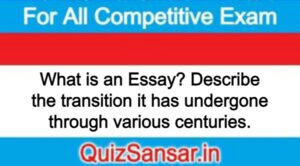
What is an Essay? Describe the transition it has undergone through various centuries.
What is an Essay? Describe the transition it has undergone through various centuries.
Ans.
Essays
An essay is a discussion in prose of a certain topic. The term essay (attempt) was first used for the form by Montaigne when he published a volume of informal pieces in 1580, which were in the form of reflections on himself and mankind. This book started the fashion of essay writing in Europe. It was the period of Renaissance from 1578 to 1625 in England. And English writers were busy producing one literary form after another. Being inspired by Montaigne, Sir Francis Bacon (1561-1626) wrote some essays on different themes. His first volume of essays under the title Essays was published in 1597. The second edition of his essays was published in 1612 and the third edition in 1625.
Essay of 18th Century
18th Century is particularly memorable. The two great essayists of early 18th century are Richard Steels and Joseph Addison. They published periodical essays in. The Tatler from 1709 to 1711, then their essays appeared in The Spectator’ until the end of year in 1712. Their essays were written on all human affairs in the most striking and entertaining way. Particularly in Addison’s hands the English essay reached the highest point of perfection. After Addison, Dr. Samuel Johnson and Oliver Goldsmith published a number of essays.
Essays in 19th Century and 20th Century
In the beginning of 19th century Charles Lamb and William Hazlitt rose as bright stars in essay writing. After them came Macaulay, Coleridge Leish Hunt. De Quincey, Carlyle, Ruskin, Matthew Arnold, Pater and R. L. Stevenson, At the first series of the Essays of Elia (1823) by Charles Lamb charmed the readers like anything. In the present century, the memorable essayists are max Beerbohm, G.K. Chesterton, E.V. Lucas. A.A. Milne, Powys and Harold Nicolson. Among the more famous are J.B. Priestly. Robert Lynd and A. G. Gardiner.
-
Write the critical appreciation of the poem No. 12 entitled Far Below Flowed.
-
Write the critical appreciation of the poem No. 11 entitled Leave this Chanting.






